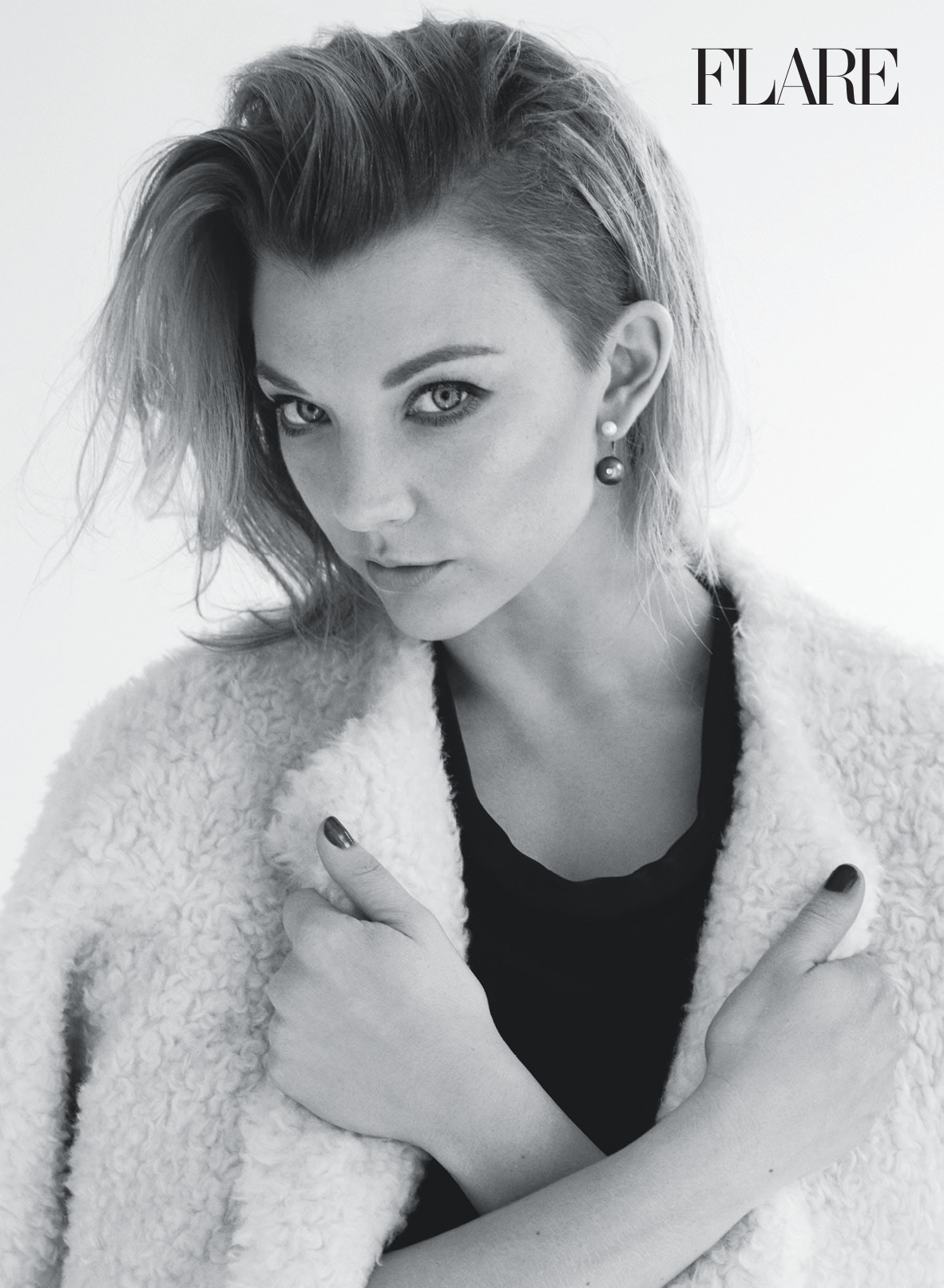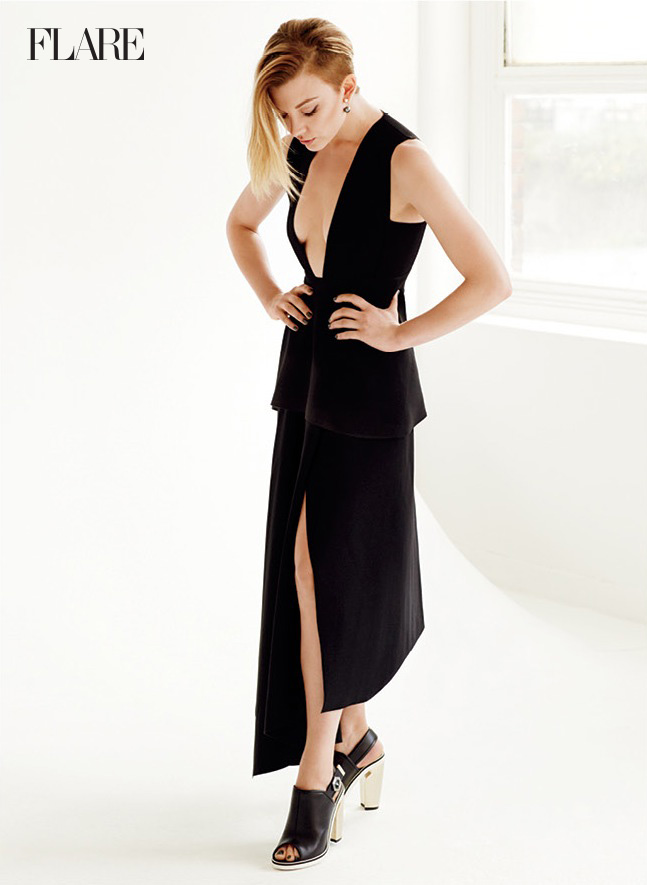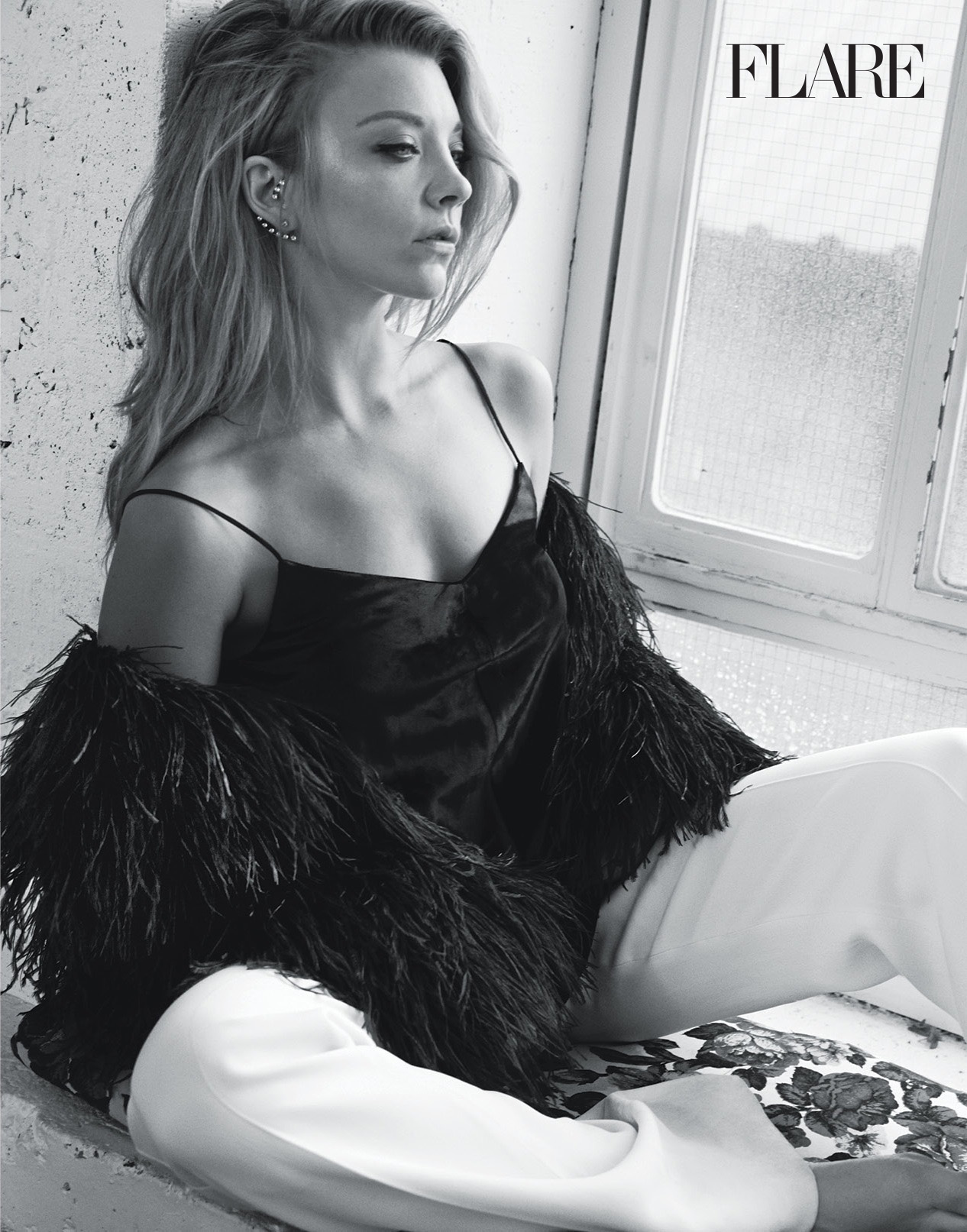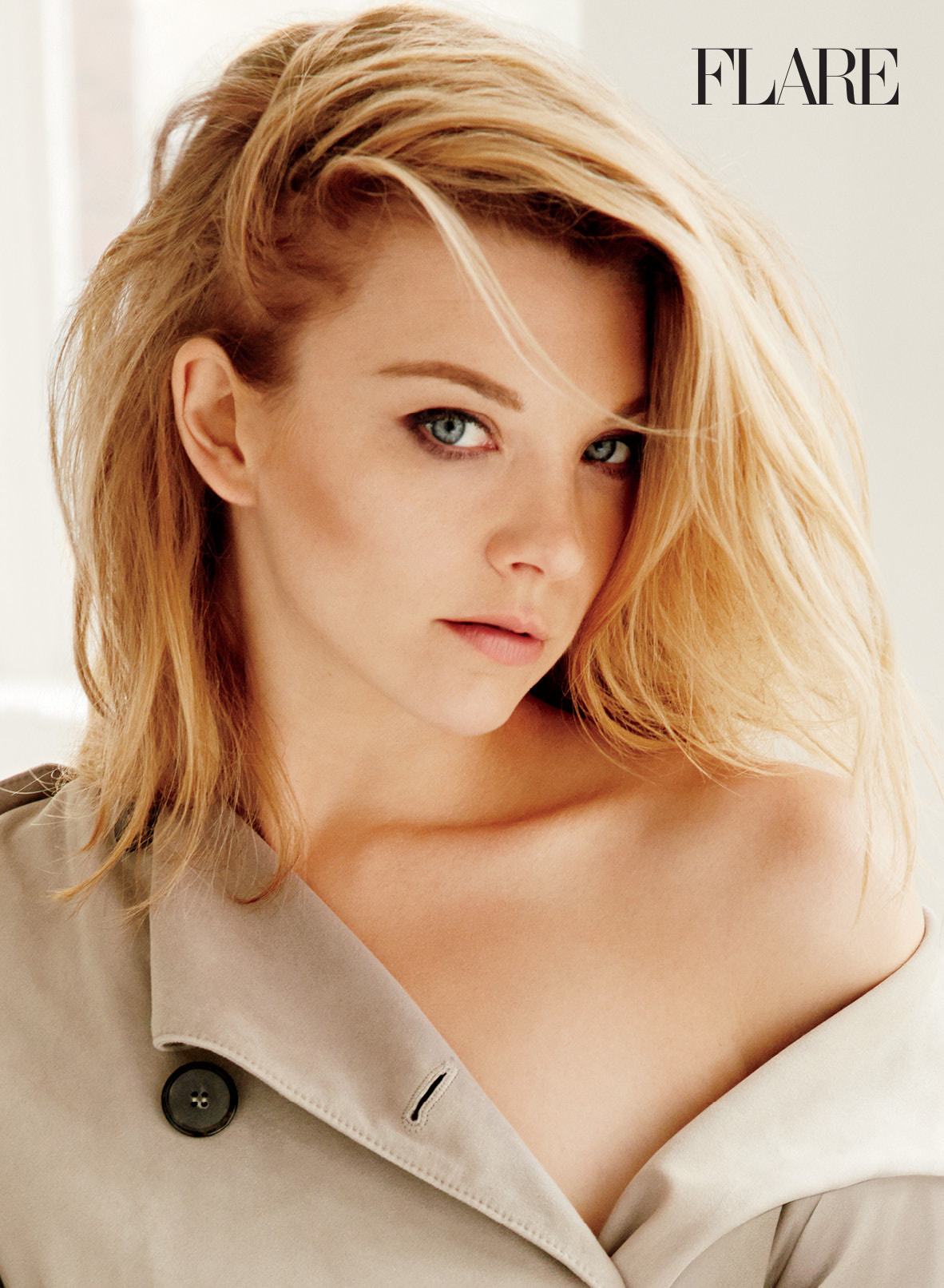Meet Our December Cover Star, Natalie Dormer!
British actress Natalie Dormer stars in two of today’s biggest franchises: The Hunger Games and Game of Thrones. We took a stroll around London’s famed V&A Museum with the multi-screen queen


“I’m so happy you wanted to come here—I love this place!” Natalie Dormer greets me with a kiss on each cheek at the entrance to London’s Victoria and Albert Museum, home to the biggest collection of decorative art and design in the world. The actress was easy to spot by her beacon-like blonde hair, though I recognized it only after watching her pose for FLARE the day before; I’d come to know Dormer as a brunette, in the role of sultry Margaery Tyrell in HBO’s most-watched (and the world’s most-pirated) series ever: the epic fantasy drama Game of Thrones (returning to HBO Canada this spring).
“I’m a natural blonde!” she exclaims. “It was funny because for the shoot yesterday, the hairstylist drew in roots. I was like, ‘You’re undermining me here, I’ve been telling people for years I’m really a blonde!’” She fidgets with the hair in question as she speaks, flipping luxurious swaths from one side of her head to the other. It’s so thick, I almost don’t notice the patch on the lower left side of her scalp where it’s only a few centimetres long, a remnant of her role in Mockingjay: Part 1 (out Nov. 21) and Mockingjay: Part 2. The films will complete the box office–devouring Hunger Games quadrilogy—worldwide gross so far: $1.68 billion—based on the young-adult books by Suzanne Collins.

Dormer, 32, plays Cressida, a documentary filmmaker who joins Jennifer Lawrence’s Katniss in her rebellion against the government of their dystopian nation, Panem. Even with blonde hair and minus the medievally garb of the default Dormer of my imagination—today she’s wearing a grey silk blouse (“from Topshop or something”) over Rag & Bone skinny jeans and ankle boots—there’s no mistaking her: the feline slant of her eyes, the swoop of her nose, the asymmetrical smile, like an artist has rendered each feature with a playful flourish. Hollywood, and the world, may be overrun with towheads, but there’s only one face like that.
Dormer is a huge history buff, she tells me, as we step into the gleaming white rotunda that houses the V&A fashion collection. She had, in fact, planned to study the subject at the University of Cambridge after graduating from secondary school in her hometown of Reading, England. Plot twist: the model student—straight As, head girl, vice-captain of her netball team and public speaking champ—misread a question on her A-levels and didn’t score the marks she needed to get in. The setback forced her to commit to a Plan B that was secretly her dream all along: becoming an actress. After three years of drama school, she landed her first film role, fittingly, in 2005’s historical romantic comedy Casanova, about the notorious 18th-century womanizer, played by Heath Ledger, and began her ascendancy to fame as Anne Boleyn in The Tudors.

Dormer makes a beeline for a display labelled 1750–1800. After studying a cream court mantua with a hooped skirt about nine feet wide (“You’d be walking through doors sideways”), she opens her purse and pulls out a paperback copy of Lady Worsley’s Whim by Hallie Rubenhold. Dormer has just accepted the lead role in the BBC adaptation about the Georgian England noblewoman whose high-profile divorce became a national scandal. “I swore I wasn’t going to get back in a corset!” says the actress, who has portrayed, along with Margaery, Anne and Casanova’s Victoria, Elizabeth Bowes-Lyon—a.k.a. the Queen Mother—in Madonna’s Wallis Simpson biopic, W.E. “But when it’s history, I’m a sucker. When it’s a real person who led a real life, I just get hooked, and I’m like, I have to know more about this human being.” She points to a mannequin snugly encased in a pink corset. “But you can see the pain I’m gonna be in!”
There’s another reason she agreed to get back in a corset: “It feels like a bit of a homecoming because when I was a teenager, I used to watch BBC costume dramas like, I want to be an actress one day,” Dormer says, remembering in particular the scene in 1995’s Pride and Prejudice when a dripping-wet Mr. Darcy encounters Elizabeth Bennett after emerging from a swim in the pond—a “pivotal moment” in British television. “I’ve never done a costume drama for the BBC. This role is teenage Natalie’s dream.”

Dormer agrees to visit an exhibit called Wedding Dresses 1775–2014, largely, I suspect, to indulge the Say Yes to the Dress junkie interviewing her. She pauses at a pale gold gown from 1780, wondering if the Lady Worsley production will involve a wedding scene. That would make Dormer, by her count, five times a bride—though only on-screen. The actress has been in a relationship with director Anthony Byrne, whom she met while filming The Tudors in Dublin, for seven years. She recently starred in a music video he directed for the Irish singer Hozier, and the couple have co-written a movie (“I’m not going to tell you about that because I don’t want to jinx it!”). They got engaged in 2011, but she has yet to go shopping for a dress—or set a date.
“It’s such a thing, right? So many little girls dream about their wedding day,” she says. “But with actresses, sometimes it’s the inverse, because we get to be the centre of attention, looked up and down, dressed up for premieres all the time. The pull isn’t quite as great.” When the day does come, she doubts she’ll be wearing a meringue; at the exhibit, she’s drawn to slimmer silhouettes, like Kate Moss’s 1920s-inspired John Galliano, though she deems it “a bit too glittery” for herself.
We get coffee and sit down in the museum’s John Madejski Garden, a pretty courtyard with tables scattered around a large oval reflecting pool, where Dormer recalls taping her Mockingjay audition on her fiancé’s Canon 7D camera. “I impersonated him a bit, since he’s a director!” Did he give her any advice? “He’s good at telling me, ‘That was sh-t, do it again!’ He’s very honest.”
Mockingjay’s director, Francis Lawrence, once tested Dormer for an NBC pilot, and remembered her ever after, he tells me later, over the phone from Los Angeles. “Natalie’s got a very strong presence and an amazing look. Having her take on the role of Cressida instantly created the character of Cressida.” The word strong comes up often in conversations about Dormer: Sam Claflin, who plays The Hunger Games’ Finnick and who worked with Dormer on The Riot Club, the British frat-boy thriller and 2014 Toronto International Film Festival favourite, just prior to her joining Mockingjay, recalls meeting her for the first time: “She was completely open and incredibly strong,” he says. “She walked into a room full of boys who knew each other inside out, but she immediately settled in and held her own.”

Dormer was in Paris, having dinner with friends, when she got the call offering her the role in Mockingjay—and asking if she’d be willing to cut off all her hair. “I had a bit of a—[gulp]—moment,” she says, but she reconciled herself to going bald. Francis Lawrence later suggested an undercut befitting of a rebel punk from Panem’s fashion-forward Capitol; Dormer cites Brazilian model Alice Dellal, who’s been rocking a half-shaved look for years, as an inspiration.
Of course, becoming Cressida took more than a haircut. “It’s really interesting because you have somebody like Jennifer Lawrence, who isn’t classically trained at all and who works entirely from her gut and her instincts, and seemingly almost doesn’t prepare; she just sort of goes with it and feels it in the moment,” says Francis Lawrence. “And then you have people like Natalie, who has really, really thought about the details and goes off between takes and you see her running things through her head. She likes to talk about it a little bit more, likes to have more information up front.”
After Casanova, Dormer didn’t land another role for nine months. “That was one of the best lessons I could have learned: never to take work for granted,” she tells me, swaddling herself in a hunter-green scarf to ward off the early-evening chill. She quotes the playwright Edward Albee: “‘If you’re willing to fail interestingly, you tend to succeed interestingly.’” She persevered: after a smattering of small roles, she landed her big break in 2007 in The Tudors. Recent high-profile gigs include a trio of femmes fatales in Captain America: The First Avenger, Rush and The Counselor (“Is it the bitchy resting face?”), but she hearkens most to Strong Female Characters. Strong, for her, doesn’t necessarily mean powerful, but rather three-dimensional. It doesn’t matter if a character is likeable. Case in point: in CBS’s modern-day Sherlock Holmes drama Elementary, she relishes her role of Jamie Moriarty, a “complete f-cking psychopath.” I mention something Lena Dunham pointed out recently at the JFL42 comedy festival in Toronto: people love characters like Breaking Bad’s meth kingpin Walter White and The Sopranos’ violent crime boss Tony Soprano, but they’re put off by Dunham’s Girls character, Hannah Horvath, because sometimes she’s “kind of a bitch.” Dormer looks thoughtful. “We don’t have enough young, female antiheroes. We don’t accept women as antiheroes the way we do the men,” she says. “Unless there’s a family get-out clause.” She cites Katey Sagal’s character in Sons of Anarchy and Tatiana Maslany’s in Orphan Black. “We accept women being complete c-nts if they’re doing it for a child.”
Margaery and Anne Boleyn, Dormer’s most famous fatales, may be queens of the honey trap, but they’re far from mere sex objects. Few of her projects could be accused of failing the Bechdel test, which assesses gender bias in films based on whether two female characters talk to each other about something other than a man. “The beautiful thing about Margaery,” says Dormer, “is that even though she keeps getting married, she’s not defined by a love interest. And Cressida is defined by her profession and her political beliefs. Since Anne Boleyn, I haven’t played a woman who’s defined by romantic love.”
She also hasn’t played many contemporary characters. “I’d love to just be a girl in a pair of jeans, running around London!” she says. “We live in one of the most complex ages for young, professional women.” For now, she’s settled for running around the city in Nike leggings: she recently completed the Virgin Money London Marathon, donating the funds she raised to the U.K. children’s charity Barnardo’s. Her time: a very respectable 3:50:57. “When you’re in the public eye, it’s hard to negotiate your relationship with your body,” she says. “But the way I look at it is: if I can run 26 miles in under four hours, then there’s nothing wrong with my body.” The big sister in Dormer—she’s the eldest of three—starts to come out. “Sometimes younger girls see things and maybe they’ve been Photoshopped or whatever, and they take it to heart,” she says, sounding doleful. “There’s all this angst, and it’s just not necessary.”

Dormer’s Game of Thrones co-star Sophie Turner, 14 years her junior, calls Dormer the big sister she never had. “She’s given me an unimaginable amount of advice,” Turner tells me. It’s easy to see why a younger actress would look up to her. “I’ve got through the angst of my 20s,” Dormer says. “I know who I am, and that’s half the battle in life.” As an actor, she adds, she doesn’t take rejection as personally as she used to. Being around Byrne has helped: “I hear the calls a director makes, and I see audition tapes, and when you start out, it’s this narcissistic thing of”—she affects a pompous voice—“‘It’s all about me and my art.’ But then you step outside of it and it is show business: it is a business.” Dormer has also learned to avoid online snipers. “I have a lopsided mouth—it’s a family quirk—and some people are very rude about it. You can find really horrible stuff: ‘sourpuss smirk.’ I don’t go down that rabbit hole anymore.”
Throughout our visit to the museum, Dormer is approached three times; a Mexican woman, close to tears, tells her she loves The Tudors; a group of giddy Portuguese high-schoolers line up for smartphone snaps; and a Bulgarian server geeks out adorably when he clocks that Margaery Tyrell is ordering an americano. Dormer graciously obliges every request that comes her way, asking names, signing autographs. But while she embraces her fans’ enthusiasm, it’s clear that fame is merely a necessary sideline to her real gig.
“I’m just an actor!” she says. “I was a daydreamer as a kid. I want to act because of whatever artistic bone is in my body. I want to explore what it is to be alive. I just want to make good sh-t.”
Now, Dormer has a meeting to get to; later, I learn it’s to discuss the lead role in Jason Zada’s The Forest, which she calls “a really interesting psychological horror.” She’ll play an American who ventures into Japan’s legendary Aokigahara forest, a notorious suicide spot, in search of her missing twin. (Shortly after our interview, she’s also confirmed as the lead in Stefan Ruzowitzky’s zombie movie Patient Zero.) More kisses, and she’s off in a blur of blonde. Running around London in a pair of jeans, ready to make more good sh-t. Succeeding interestingly.
Would Natalie Dormer survive the Hunger Games? Find out in our behind-the-scenes video as editor-in-chief Cameron Williamson chats with our cover star.








